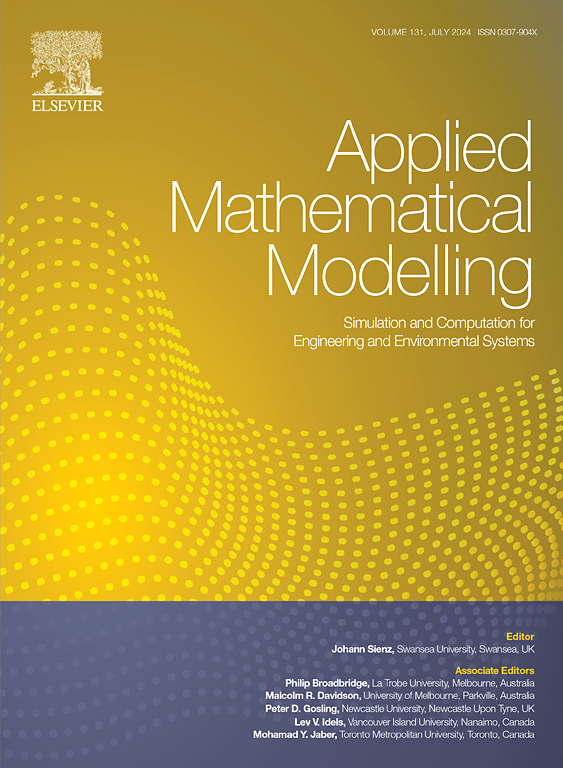Adaptive control scheme for cooperative transport systems navigation under uncertainty
IF 4.4
2区 工程技术
Q1 ENGINEERING, MULTIDISCIPLINARY
引用次数: 0
Abstract
An adaptive robust control scheme for a cooperative transport system is proposed to tackle the challenges arising from parameter uncertainty, external interference, measurement errors, and other factors. The cooperative transport system consists of a leader automated ground vehicle, a baggage carrier, and a follower automated ground vehicle. Firstly, a mechanics-based independent dynamic model without constraints is established for each component within the system, and the coupling relationship between components is analyzed to design the constraint function. Secondly, to address inaccuracies in initial conditions, the trajectory errors in both their zero- and first-order forms are introduced. A closed-form dynamic model that is subject to constraints is then developed for the entire cooperative system, incorporating both structural and performance constraints. Thirdly, an innovative adaptive robust control scheme is introduced for mechanical systems facing uncertainty. An adaptive law is devised to estimate the bounds of uncertainty. The control is deterministic and can be mathematically expressed in a closed-form. Fourthly, a constrained optimization problem is formulated using the fuzzy information of uncertainty to choose an appropriate optimal gain of the adaptive law. This is achieved by minimizing the combination of average fuzzy system performance and control effort. Finally, numerical simulations are conducted to verify the effectiveness and adaptability of the proposed control method. The performance of controlled cooperative transport system is both deterministically guaranteed and fuzzily optimized.
不确定条件下合作运输系统导航的自适应控制方案
针对参数不确定性、外部干扰、测量误差和其他因素带来的挑战,提出了一种合作运输系统的自适应鲁棒控制方案。该协同运输系统由一辆领跑者自动地面车辆、一辆行李运输车和一辆跟随者自动地面车辆组成。首先,为系统中的每个组件建立基于力学的无约束独立动态模型,并分析组件之间的耦合关系,从而设计约束函数。其次,针对初始条件的不准确性,引入了零阶和一阶形式的轨迹误差。然后,为整个合作系统开发了一个受约束的闭式动态模型,其中包含结构和性能约束。第三,针对面临不确定性的机械系统引入了创新的自适应鲁棒控制方案。设计了一种自适应法则来估计不确定性的界限。该控制是确定性的,可以用封闭式数学表达。第四,利用不确定性的模糊信息制定了一个约束优化问题,以选择自适应法则的适当最优增益 kopt。这是通过最小化模糊系统平均性能和控制努力的组合来实现的。最后,通过数值模拟验证了所提控制方法的有效性和适应性。受控协同运输系统的性能既得到了确定性保证,又得到了模糊优化。
本文章由计算机程序翻译,如有差异,请以英文原文为准。
求助全文
约1分钟内获得全文
求助全文
来源期刊

Applied Mathematical Modelling
数学-工程:综合
CiteScore
9.80
自引率
8.00%
发文量
508
审稿时长
43 days
期刊介绍:
Applied Mathematical Modelling focuses on research related to the mathematical modelling of engineering and environmental processes, manufacturing, and industrial systems. A significant emerging area of research activity involves multiphysics processes, and contributions in this area are particularly encouraged.
This influential publication covers a wide spectrum of subjects including heat transfer, fluid mechanics, CFD, and transport phenomena; solid mechanics and mechanics of metals; electromagnets and MHD; reliability modelling and system optimization; finite volume, finite element, and boundary element procedures; modelling of inventory, industrial, manufacturing and logistics systems for viable decision making; civil engineering systems and structures; mineral and energy resources; relevant software engineering issues associated with CAD and CAE; and materials and metallurgical engineering.
Applied Mathematical Modelling is primarily interested in papers developing increased insights into real-world problems through novel mathematical modelling, novel applications or a combination of these. Papers employing existing numerical techniques must demonstrate sufficient novelty in the solution of practical problems. Papers on fuzzy logic in decision-making or purely financial mathematics are normally not considered. Research on fractional differential equations, bifurcation, and numerical methods needs to include practical examples. Population dynamics must solve realistic scenarios. Papers in the area of logistics and business modelling should demonstrate meaningful managerial insight. Submissions with no real-world application will not be considered.
 求助内容:
求助内容: 应助结果提醒方式:
应助结果提醒方式:


